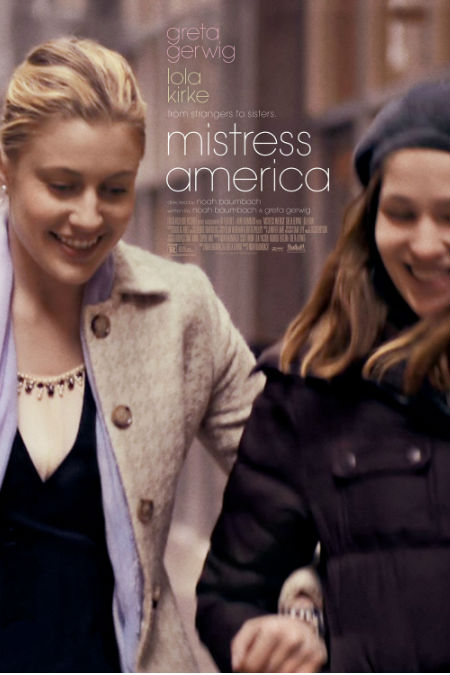
People, by and large, are not a terribly self-aware bunch.
Sure they know what do they and don’t like in broad, abstract terms – chocolate vs. vanilla ice cream, beach holiday vs. the snow – and even on some deeper existential questions, but in general, many of us are too busy rushing hither-and-yon to really give any thought to the deeper questions of existence.
Tracy Fishko (Lola Kirke), newly installed freshman at a women’s liberal arts college in new York Cityand the protagonist in Noah Baumbach’s latest ode to fallible humanity, Mistress America, is not one of those people.
Arriving at college with expectations of greatly expanded social circles, intense learning experiences and an almost mythological “New York experience”, she is at first disappointed that her big, new exciting life bears no resemblance to what she’d envisaged.
In a phone call to her mother (Kathryn Erbe), she bemoans the fact that she feels like a wallflower at a party where no one seems particularly interested in getting to know her; hers in not a passive complaint – she has tried and failed to engage with people her in dorm, her classes and by seeking membership of the Mobious Literary Society, all to no avail.
And then into her life walks, or rather, surges with palpable, highly-articulate life force Brooke (Greta Gerwig).
Tracy’s soon-to-be stepsister,Brooke seems to have everything her new baby sister does not – stylish, literate friends, an endless buffet of professional and personal possibilities, and the charm, personality and intellect to make the most of them.
Brooke, is in short, everything young, impressionable Tracy thinks she wants to be.
But as is the way with these things, appearances can be deceiving.
In short order, and after Tracy has fallen headlong in love with everything Brooke is, represents and does, the wheels start falling off this brash, exciting new vision of a perfectly-wrought New York future.
Rather than an unassailable, unalloyed success, it emerges that Brooke doesn’t have it together at all, and that all the balls she had in the air, the shiny harbingers of a perfect life in the offing, are in danger of falling to the ground in one calamitous heap.
To the of writer/director Noah Baumbach and Greta Gerwig who penned the wryly amusing, insightful and meditative/screwball inclined script, Tracy is not presented as an impressionable, guileless ingenue nor Brooke as a screw-up in shiny, pretty clothes with the gift of the gab.
Rather they skillfully draw out that both women are the products of their own rather imaginative self-perceptions, or lack thereof.
Brooke, far from being in touch with herself to the degree initially suggested, is in fact, a few moments of intense self-realisation aside, wildly blind to her own weaknesses of character and intent.
She is the quintessential all-talk-and-little-action stereotype, with grand plans for a TV show, a cabaret performance on Broadway and a restaurant that is pitched as something approaching heaven here on earth, such are its lofty ideals.
Tracy, interestingly, realises all this early on, choosing to set this inisght aside in favour of harnessing Brooke’s joie de vivre and energy to supplement her own life’s wan prospects and forward momentum.
So aware is she of the broken puppet strings behind Brooke’s facade of success, that she uses her new familial bestie as the template for a character in a short story that she hopes will finally gain her access to the hallowed Mobius Society
By the film’s end, any idea that Brooke has a lock on a successful life, and Tracy does not, have successfully, and at times, highly amusingly upended, with the former pretty much carrying on as before, despite the near miss of almost losing it all, and the latter effectively parlaying what’s observed and learnt into some major life changes.
What carries the film successfully is the immediate likability of both characters, despite some major flaws on both sides.
And Baumbach’s willingness to portray failure once again as simply a learning experience – or not, depending again on how self-aware you are – and not a death sentence, lends the film a relatable sense of humanity that engages you in a way that the initial pell-mell sense of two lives colliding may not suggest.
Mistress America also does a rather fetching dance between introspective self-awareness, or its lack, and screwball farce, shifting between the two in ways that are amusing and insightful in a very Woody Allen-esque way.
Both Brooke and Tracy are gifted with some particularly witty and insightful lines, and the chemistry between them is a delight to watch, regardless of whether in they’re in best friend or fractious enemies mode.
The supporting players too are a pleasure watch, most notably Tracy’s best friend at college Tony (Matthew Shear), his prone-to-jealous girlfriend Nicolette (Jasmine Cephas Jones), and Brooke’s social-climbing ex-best friend Maimi-Claire (Heather Lind), all of who get their chance to join in the self-aware/not-quite-self-aware “fun”.
In the end though, the barbed farce of Mistress America brings with it a reassurance that all of us entertain the lesser angels of our nature far too much for own good but that that’s not such a bad thing if we’re self-aware enough to do something worthwhile and life-changing with the fallout.